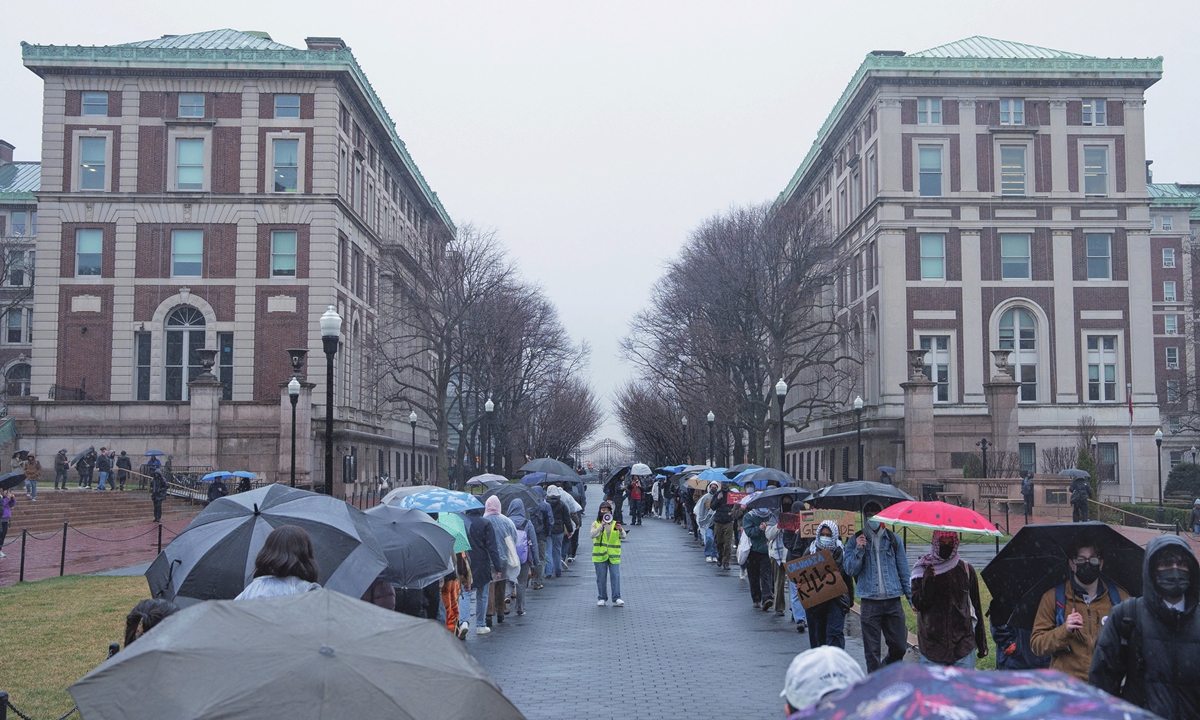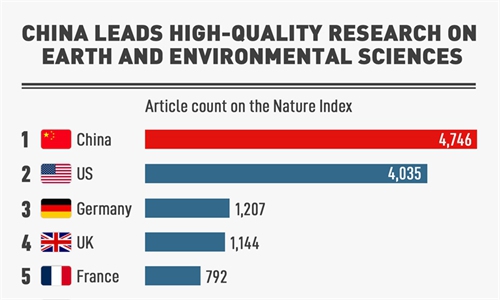
Student workers of Columbia union members protest Columbia University's recent policy changes and call for protection of international students, restoration of funding, and academic freedom at Columbia University in New York City, US, on March 24, 2025. Photo: IC
Editor's Note:
In recent years, the US has faced unprecedented challenges to its ability to attract top global talent. The "brain drain" in the field of scientific research has been frequently discussed in the media and academia, especially under the current US administration's "America First" policy. The Global Times brings together three experts from China, the US and Europe to discuss how Washington's policy is driving away scientists and its impact on the US' research ecosystem, global talent mobility as well as the future of the global competition in scientific research.
Anthony Moretti, associate professor at the Department of Communication and Organizational Leadership at Robert Morris University
History reminds us that one reason to account for America's prestigious position in areas such as science is that it consistently opened its arms to researchers across the world. Likewise, immigration policies that welcomed such scholars ensured that the US benefited from intellectual firepower whether it was created at home or brought in from elsewhere. Now, America risks suffering from brain drain.
How is it possible that the US, the mythical land of the free, is now a place some scholars want to flee?
Through its insistence that too many colleges and universities are dedicated to "woke" policies and practices and its equally corrosive threats to take away critical grant money, the administration is making it harder and harder for researchers at America's most exceptional institutions to do their jobs. Those with the scholarship or research records that allow them to consider non-US universities are looking elsewhere. Why risk watching decades of work be destroyed?
Many scholars look at the federal government's determination to deport foreign-born graduate students and cannot help but wonder if faculty will be next. Granted, the courts might step in and make it harder for the government to kick international graduate students out of the country. But who could blame a foreign-born researcher for thinking that the courts could decide instead to endorse the president's plans? Why risk deportation?
Do enough people in Washington, and more specifically at the White House, understand the ramifications of losing some of the most intelligent people currently living in the country? US citizens are often told that their country's freedoms explain why millions of people, including the most educated, from across the globe want to live and work in America. That story now rings hollow. Over the past few decades, the US built the largest innovation engine the world has ever seen, but that engine risks short-circuiting.
Li Zheng, research fellow at the Institute of American Studies, China Institutes of Contemporary International Relations
In the post-World War II era, the US built an unrivaled innovation system with its open policies and abundant funding, attracting top talents from around the world. However, this long-standing position is being challenged as recent "America First" policies have created obstacles to continued progress.
For a long time, the US innovation system has been highly dependent on government strategic guidance, diverse teams and overseas scientists. The government has guided the scientific research system through many organizations, such as the National Institutes of Health (NIH) and the National Science Foundation, to explore the best path. The relative transcendence and independence of scientific research institutions also allow scientists to focus their own research areas and make freer choices. Besides, foreign scientists have been the mainstay of the US innovation system, allowing it to continue to gather the world's best talents.
However, the current US administration's science policy has brought harm to the US science, technology and innovation system in three ways. First, research and development funding has shrunk dramatically, with many scientific research organizations being the focus of budget cuts and layoffs. Second, the research climate in the country has been politicized. Third, the US has become more inward-looking and xenophobic in terms of scientific and technological exchanges.
Together, these have put the US science, technology and innovation system at risk of a historic setback. As the US risks losing its researchers more and more, the world isn't stopping. Europe and Canada are welcoming US scientists who want to run away from the country with open arms. Thirteen European governments asked the EU to welcome "brilliant talents from abroad who might suffer from research interference and ill-motivated and brutal funding cuts," while Canada has already become the destination for US scientists who have been laid off and are considering running away. Washington's decision to move against the science and technological development has also given more Asian countries a chance to catch up. China, South Korea and Singapore are investing more in R&D and building world-class research infrastructures. These countries may replace the US as a pole of global science and technology innovation in the future.
Sebastian Contin Trillo-Figueroa, a geopolitics analyst from Spain with a specialization in EU-Asia relations
The Trump administration's policies toward science have researchers witness a core civil right vanishing at speed. As a result, many conclude their work is at risk; and that they could pursue it more freely elsewhere.
Yet it's important to recognize that US researchers remain the best-paid in the world, with access to unmatched research funding. Their decision to leave, despite such advantages, underscores the scale of discontent.
This could have a severe negative effect on the US' scientific and tech development and innovation. First, US scientific leadership is now exposed to internal political turbulence in a way not seen before. Second, allies may begin to sever their reliance on US-based research, while the erosion of institutions like NIH weakens US influence in global science diplomacy. Third, the US may serve as a cautionary tale, demonstrating how easy it is to lose global talent, rather than attract it.
The deeper concern for the US may not be technological decline alone, but a fracture between national identity and its scientific community. Researchers, like many immigrants today, may come to believe the so-called American Dream no longer exists.
The outflow of US-based scientists redistributes knowledge and dilutes American dominance over global research. However, the loss of disillusioned US-based scientists is a net gain elsewhere. The weakening of US research leadership opens space for Europe and Asia to expand their scientific influence. Europe is well-positioned to absorb this shift, drawing on institutional infrastructure, transnational networks, and appeal as a space offering welfare protection and a high quality of life.
While Europe may lead in regulation-intensive fields, Asia - driven by China, India and regional innovation hubs - can pursue development-focused models anchored in long-term planning and state-backed research. China, in particular, may use the opening to advance its own scientific models, supported by large-scale investments and increasingly competitive conditions for high-skilled migrants. If China capitalizes on this exodus, it could absorb much of this talent - and, in doing so, tilt global scientific leadership.
The influx of US-trained scientists becomes not only a boost to research excellence, but a lever for reordering global hierarchies of expertise. Institutional responses across Europe and Asia should be strategic. Talent absorption feeds national innovation strategies and enhances soft power. For instance, China may scale up various initiatives with greater flexibility, aiming to capture expertise while managing reputational risks.



